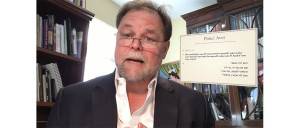One of the most difficult things we experience is the loss of a loved one. Death takes them away from us. We struggle with our new reality, whether the loss was sudden or even if it was expected, the moment of truth is not as expected.
Death is a complicated emotional process in which we experience loss, then grief and then we try to move forward. Jewish tradition gives us some wonderful coping mechanisms that acknowledge and honor the departed, our relationship to that person and a means of working through the loss.
When we attempt to circumvent or short-circuit the process we lose out. In our fast paced world, we want to “get it over with,” and move on. I frequently hear the need to return to work, which is more a desperate attempt to escape the discomfort of the current situation and not deal with it. Some of us suppress or even ignore our feelings attempting to deny the pain, leaving things unresolved. Our feelings will however come back to haunt us. A perfunctory approach does not serve us well. Our hearts just do not work that way. Judaism has a better way to deal.
Shiva, the traditional Jewish mourning period, is seven days (the word Shiva is Hebrew for seven). It is tempting to shorten this period to a three-day Shiva, or even a one-day observance. I did once hear of a family that decided they would sit Shiva Saturday night at the Italian restaurant/diner. These recastings of Shiva are reflections of everything but the acknowledgement of a profound loss and the grieving process that accompanies such a loss. Sadly, the people who survive are the ones who suffer as a result.
Our Jewish tradition wisely helps guide the survivors through the process. You quite literally sit with your grief, fully acknowledging this place and the loss. Your family, friends and the community gathers to support you in your time of aloneness to share that indeed you are not alone. You experience what we all will experience and we are both connected and strengthened by this knowledge. By being together we say you will get through this with our support and love. The community continues to show its support and love through the institution of the synagogue as a place where you can find not only solace but a caring community that can help you reintegrate as the immediacy of the pain begins to find a place in your heart rather than on your sleeve.
There is joy in life and pain in its loss. How we navigate these is what family, friends and community is all about. The traditional Hebrew phrase we share with someone who experiences a loss might be translated as: “May you find comfort in this place among family and friends.” This is among the values that makes embracing Judaism something sacred and profound.

